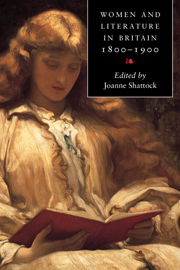Book contents
- Frontmatter
- Contents
- List of contributors
- Acknowledgments
- Chronology
- Introduction
- 1 The construction of the woman writer
- 2 Remaking the canon
- 3 Women and the consumption of print
- 4 Women writing woman: nineteenth-century representations of gender and sexuality
- 5 Feminism, journalism and public debate
- 6 Women's writing and the domestic sphere
- 7 Women, fiction and the marketplace
- 8 Women poets and the challenge of genre
- 9 Women and the theatre
- 10 Women writers and self-writing
- 11 The professionalization of women's writing: extending the canon
- 12 Women writers and religion
- 13 Women writing for children
- Guide to further reading
- Index
8 - Women poets and the challenge of genre
Published online by Cambridge University Press: 03 October 2009
- Frontmatter
- Contents
- List of contributors
- Acknowledgments
- Chronology
- Introduction
- 1 The construction of the woman writer
- 2 Remaking the canon
- 3 Women and the consumption of print
- 4 Women writing woman: nineteenth-century representations of gender and sexuality
- 5 Feminism, journalism and public debate
- 6 Women's writing and the domestic sphere
- 7 Women, fiction and the marketplace
- 8 Women poets and the challenge of genre
- 9 Women and the theatre
- 10 Women writers and self-writing
- 11 The professionalization of women's writing: extending the canon
- 12 Women writers and religion
- 13 Women writing for children
- Guide to further reading
- Index
Summary
What form is best for poems? Let me think
Of forms less, and the external. Trust the spirit,
As sovran nature does, to make the form;
For otherwise we only imprison spirit
And not embody. Inward evermore
To outward – so in life, and so in art
Which still is life.
(Aurora Leigh, fifth book, lines 223–7)Romanticism's rejection of classical generic convention in the language and form of poetry was a great boon for women writers. While Thomas de Quincey, lamenting his brilliant mother's lost talents, extols the hidden genius of women letter-writers, he still unthinkingly boasts of his own prowess in Greek and Latin, learned while a public school-boy, and a mark of privilege rarely available to women and girls in the nineteenth century. While De Quincey may have followed the Wordsworths to Dove Cottage, he apparently did not share Samuel Coleridge and William Wordsworth's egalitarian notions of language, whereby poetry was redefined, in the famous Preface to Lyrical Ballads (2nd edn, 1800) as the words of ‘a Man speaking to Men’. This new definition brought poetic language back into the common sphere, linking it once more with its roots in oral culture, where, in spite of such an apparently masculist formulation, it was soon taken up by a broadening band of women poets. Among these, of course, were some who, like Elizabeth Barrett herself, were privileged enough to have gained access to an education in the classics, however unsystematic that might have been, and who had been able to draw on that knowledge in producing their poetry.
- Type
- Chapter
- Information
- Women and Literature in Britain 1800–1900 , pp. 162 - 188Publisher: Cambridge University PressPrint publication year: 2001
- 2
- Cited by



